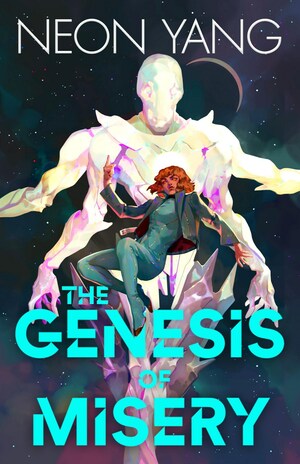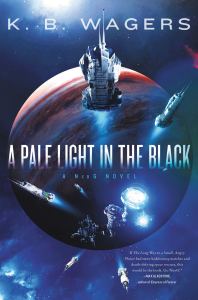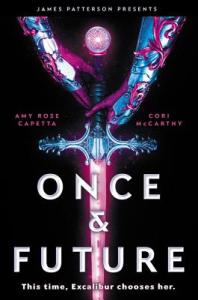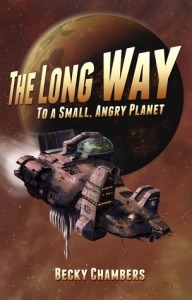Title: The Genesis of Misery
Series: The Nullvoid Chronicles
Author: Neon Yang
Genre: Space Opera
Trigger Warnings: War, death, violence, unreality (severe), injury, sexual content (consensual, minimal descriptions), terminal illness, parent death, religious trauma, religious bigotry (mild), mental illness (delusions/hallucinations), confinement, involuntary sedation with drugs, medical content (mentions)
Back Cover:
An immersive, electrifying space-fantasy, Neon Yang’s debut novel The Genesis of Misery is full of high-tech space battles and political machinations, starring a queer and diverse array of pilots, princesses, and prophetic heirs.
It’s a story you think you know: a young person hears the voice of an angel saying they have been chosen as a warrior to lead their people to victory in a holy war.
But Misery Nomaki (she/they) knows they are a fraud.
Raised on a remote moon colony, they don’t believe in any kind of god. Their angel is a delusion, brought on by hereditary space exposure. Yet their survival banks on mastering the holy mech they are supposedly destined for, and convincing the Emperor of the Faithful that they are the real deal.
The deeper they get into their charade, however, the more they start to doubt their convictions. What if this, all of it, is real?
A reimagining of Joan of Arc’s story given a space opera, giant robot twist, the Nullvoid Chronicles is a story about the nature of truth, the power of belief, and the interplay of both in the stories we tell ourselves.
Review:
I picked this up for two reasons: a nonbinary protagonist and the idea of Joan of Arc but in space. And you know, this book definitely has both of those things. Misery is most definitely nonbinary. And there definitely are Joan of Arc-type elements to the overarching plot (although you probably have to know that’s what it’s supposed to be to spot them – it’s definitely more “Joan of Arc-inspired” than “space opera retelling of Joan of Arc”).
But if you go in expecting just that, you are not at all going to be prepared for what The Genesis of Misery is going to throw at you. Because like I said, those elements are there, but they are definitely not the main thrust of the story.
Before I go too far, I do want to talk about Misery for a moment. (I’m going to be using she/her pronouns here, because while Misery uses both they/them and she/her, the narrative primarily uses she/her.) She’s an interesting character by herself. She’s a bit of a troublemaker – not for the sake of making trouble or being rebellious, but because she just has other priorities that rank higher than “obey the rules.” One of those priorities is self-preservation. Born with the disease that killed her mother, and experiencing the delusions and hallucinations that the disease causes, her driving motivation at the beginning of the book is survival. And the best way to do that seems to be to convince everyone that the symptoms of her terminal illness are actually symptoms of being god’s chosen messiah. All of that makes for a very interesting character. Her tenacity, resourcefulness, and general focus on prioritizing what matters to her over what people around her want her to do made her compelling and enjoyable to read about.
I haven’t read many unreliable narrator stories – not intentionally, that just hasn’t been a big aspect of my reading in general. Misery definitely qualifies as one, though, and in a really interesting way. She’s unreliable because she experiences hallucinations and delusions as a symptom of her illness, and she is very aware of that fact. So I may not be able to tell if the narrative is telling me the truth, but neither can she. In fact, she was so unreliable that I ended up believing the exact opposite of whatever she believed. At the beginning, she was 100% sure it was just hallucinations and she was faking the messiah thing as a survival strategy. At that point, I figured the twist would be that she was really divinely chosen after all. But as the story goes on, she began to slowly begin to think that maybe she was god’s chosen after all – and I began to doubt that she really was the messiah, or even that this deity existed in the first place. It wasn’t really an unpleasant experience, but it was weird to basically switch opinions with the protagonist throughout the course of the book.
This review is already pretty long, and I haven’t even gotten into the plot. But honestly, the plot is not really all that important here. In fact, you could argue that there really isn’t much of one. Misery’s people are at war with the Heretics, who have rejected their god and are trying to invade. Misery is playing messiah (or growing into the role of messiah, depending on who you believe) to cover for the fact that she has a fatal disease. A lot of people are doing politics and such around Misery and have big plans for this and that, but for the most part Misery is doing her best to 1. Stay alive, 2. Stay not imprisoned, and 3. Convince people that the weird stuff about her is from messiah-ness instead of mind-altering space disease, in that order. Sure, there’s some Pacific Rim-style mech battles in space, but those don’t come in until quite a ways through the book and they’re not what it’s about anyway.
What really makes this story work is the religious aspect. This society has one god, the one true god, who agreed to help the humans who dispersed among the stars. This deity chooses saints, identifiable by their iridescent hair, who have powers to activate and control special types of stone that are used for all kinds of things through this society. This religion is integrated so deeply with the society that they never actually talk about a religion or name the faith – knowledge of this deity, following religious observances, the way the saints’ ability to control special stones make society function, it’s just part of how things are. At the beginning, despite being raised in the church, Misery doesn’t even believe in this deity. But ideas of heresy, orthodoxy and orthopraxy, paying lip service to religious rules while doing what you want anyway, the difference between ethics and religiosity, power structures, belief, and fanaticism are wound throughout the whole story. I don’t really know how to describe it. As someone raised in a religion that was big into fanaticism, private hypocrisy, and ignoring the spirit of the rules where possible, I found it both strange and sci-fi while simultaneously intimately and painfully familiar. Watching Misery start to believe that maybe she was the messiah had a similar ring – it was nearly the same process as my journey out of religion, but the opposite direction. It left me feeling a bit disoriented – which is, honestly, an appropriate feeling for this book.
I don’t think I have adequately expressed yet my overall opinion of this book. It’s good. It’s very, very good. But it’s an uncommon type of good. Some really good books hype you up. They get your adrenaline pumping, leave you emotionally exhausted at the end, and make you want to yell from the rooftops that everyone should read this book. (Honestly, as much as I liked it, if you’re not up for a book that’s heavily about weird space religions, you probably won’t enjoy it very much.) Instead, it’s a much quieter kind of good. It makes me want to slow down, savor the story, and appreciate the richness of the world and the journey. It makes me want to think and linger over all the religious elements, both thematic and emotional. There’s some bittersweet tones as I understand exactly why Misery is doing what she’s doing but I’m pretty sure it’s going to be painful for her. I can already tell I’m going to be thinking about this one for a while.
The Nullvoid Chronicles:
- The Genesis of Misery




